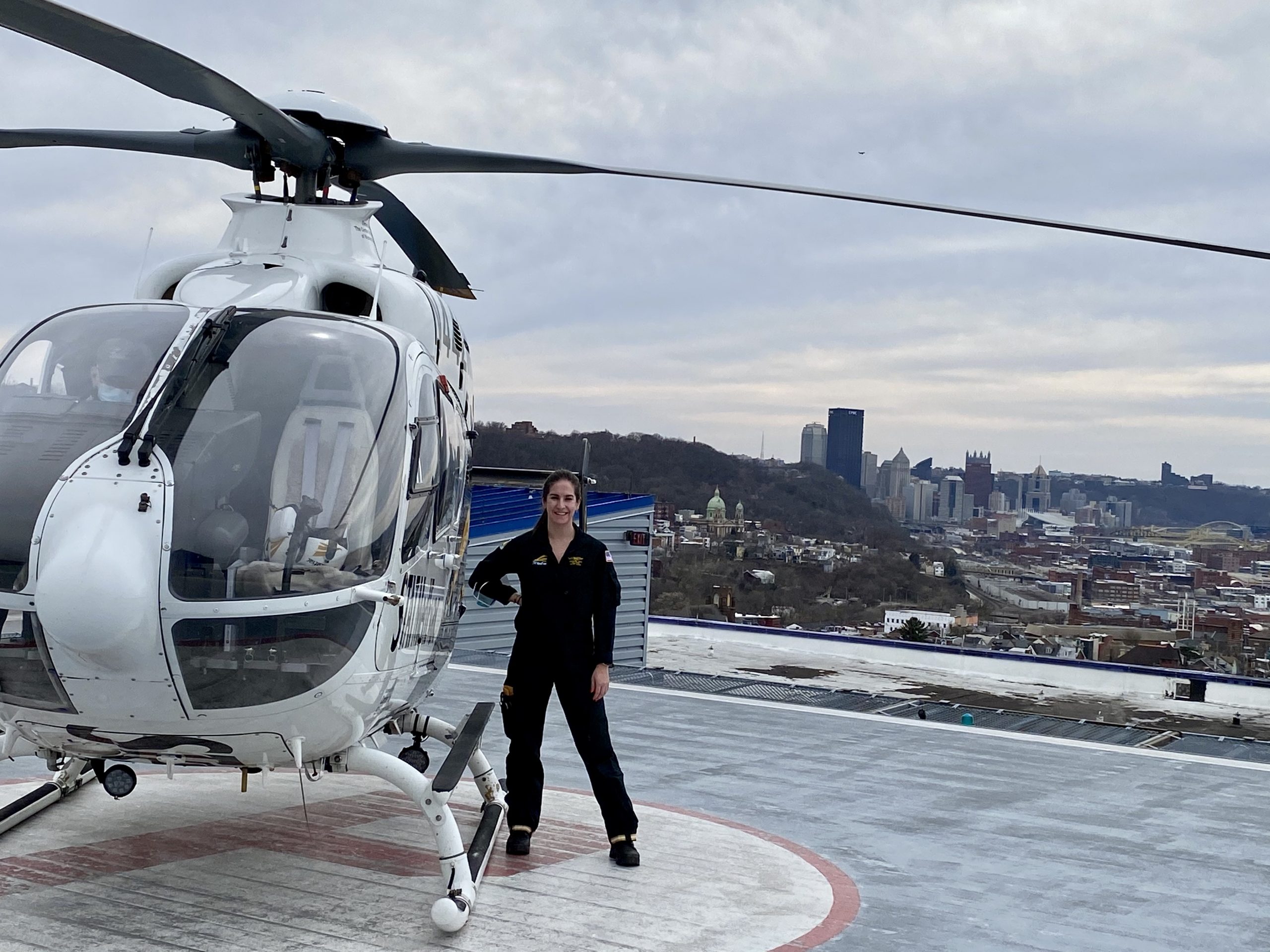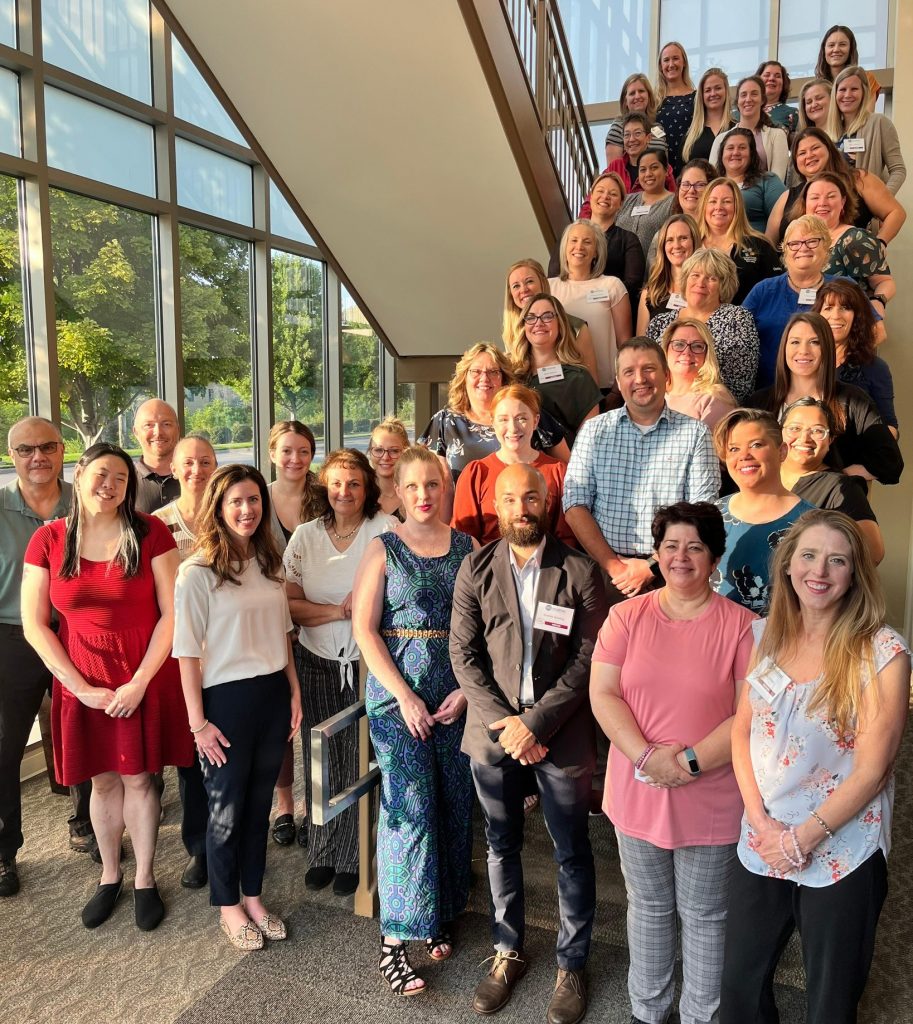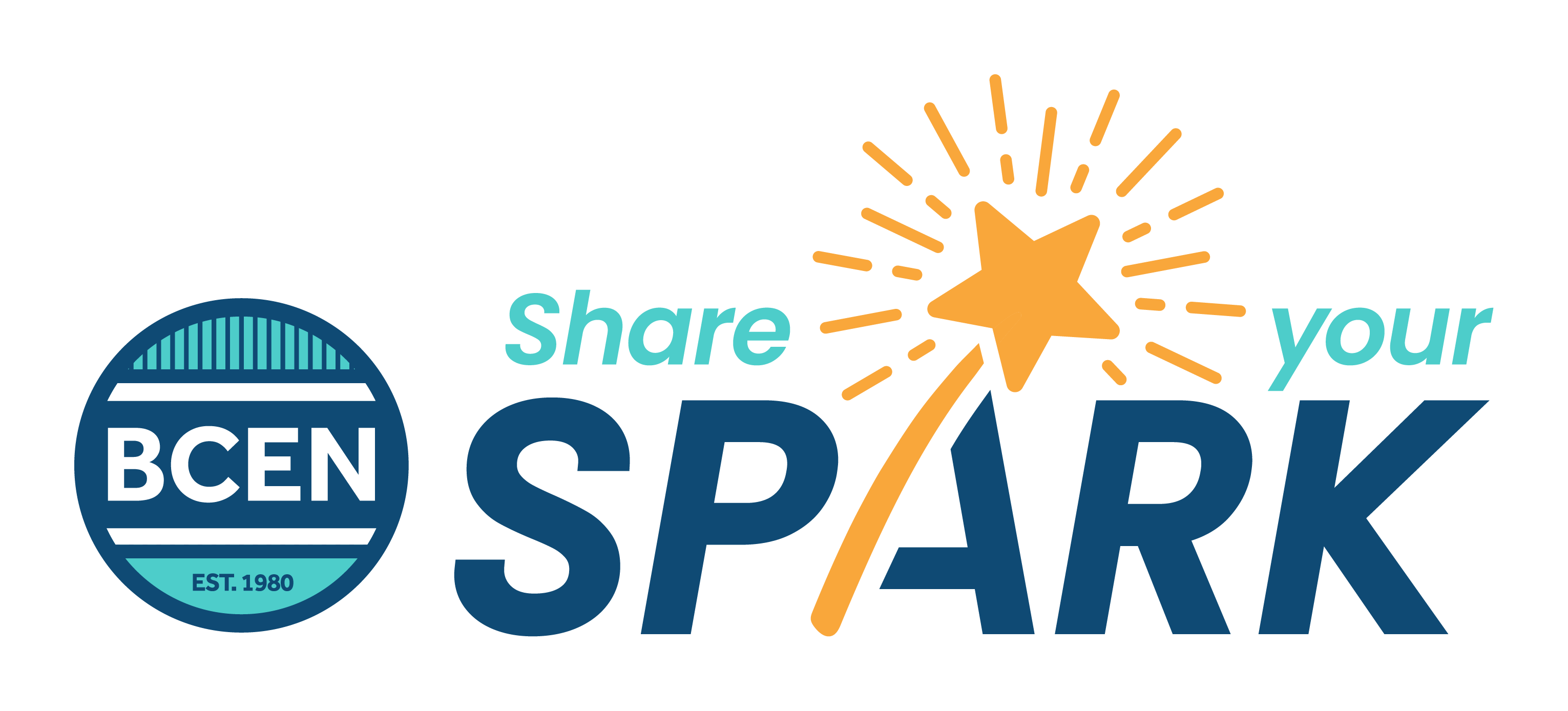
Our interview with Caroline Levin is the second installment of BCEN’s new “Certified Spark” series, and we’re proud to feature it in our newsletter, on bcen.org, and on BCEN’s social channels. Will your story be next? Tell us your Certified Spark story.

A Cut Above The Rest
Following three years in a community hospital ED and seven years in the University of Maryland Medical Center R. Adams Cowley Shock Trauma Center multi-trauma intensive care unit, Caroline Levin, BSN, RN, CEN, CCRN, CFRN, PHRN, fulfilled her dream of being a flight nurse while still working in the ICU part time, and then earned her CFRN in 2018.
While she still flies missions a few days each month, in her current role as Education Coordinator for STAT Medevac in Pittsburgh, Pennsylvania, Caroline focuses on helping flight and ground transport nurses be the best certified transport nurses they can be.
Being in conversation with Caroline means being inspired by her passion for flight nursing, learning, and supporting the success and advancement of every nurse she works with or meets.
Caroline: One of the biggest things that sets aside certified nurses is that certifying is voluntary. Having a certification means that you’ve gone above and beyond to make sure you are on top of your game and know exactly what you need to do in very critical situations. We are caring for the sickest of sick patients. As certified nurses, we’ve gone out of our way to learn as much as we can to be able to do the right thing for our patients.
As a mentor, a friend, and a certified nurse, it’s so rewarding to see a nurse walk in with a giant smile on their face and say, “I passed my exam!” It’s pretty awesome how those four letters after your name can really have such an impact. It instills a lot of confidence, and it’s truly exceptional.
Leaders and Standard Setters
We asked Caroline what it is about nurses who choose to become certified that makes them a natural leader.
Caroline: Whether or not you think you are a leader, by being certified you are setting that standard of, “Hey, we’re not settling for the bare minimum here. We’re holding ourselves to a higher standard.” Certification sets you apart as someone who will put in the work and who continues to learn. I think a lot of people really look up to that, especially if being certified is something they want to achieve also. It really helps them to look to certified nurses as someone they want to be like. So, that leadership is also about helping new nurses, and even experienced nurses, achieve the certification.
Trust Matters When Every Second Counts
As Caroline explained, a lot of STAT Medevac patients suffer from time-sensitive disease processes … heart attacks, strokes, sepsis, life- and limb-threatening injuries. She talked about how important it is that flight nurses and flight teams can expedite care and provide a high level of care during transport even without all of the resources of a hospital.
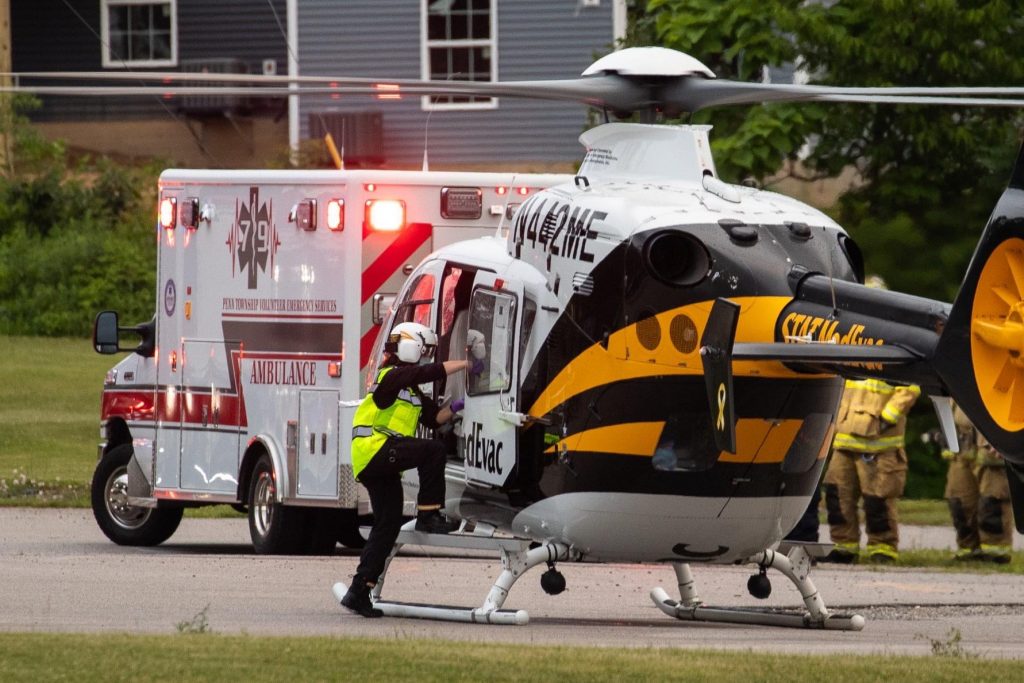 Caroline: Something that is very unique to transport medicine in general, and specifically flight medicine, is that we are truly the eyes and ears of the physicians who don’t fly with us. We have to assess the patient and determine whether the report that we got is accurate or not accurate, what has changed since we got the report, and how that is going to impact the care that we’re going to deliver.
Caroline: Something that is very unique to transport medicine in general, and specifically flight medicine, is that we are truly the eyes and ears of the physicians who don’t fly with us. We have to assess the patient and determine whether the report that we got is accurate or not accurate, what has changed since we got the report, and how that is going to impact the care that we’re going to deliver.
We make tons of phone calls and consults with our physicians, and after being certified and after flying for enough time, our physicians and our medical department team really rely on us as certified nurses to say, “I know this is the report that we were given, but this is what’s going on now.” And not necessarily asking for orders, but rather telling them these are the orders that I’m anticipating you’re going to give me to take care of this patient.
I think this helps expedite a lot of critical care for the patients because there’s not this “well what about this, and what about that” conversation. It’s clear cut: This is what I’ve assessed, and this is what I’ve determined. And from a clinical standpoint, it sets us well beyond relaying information to reporting and recommending. Being asked “what do you think?” by a physician is a high compliment, and it reflects their trust in our assessment and clinical expertise to manage our patients.
Also, there are a lot of times when we don’t consult, but are following our protocols. Our physicians put a lot of trust in us as certified nurses that we’re making the right judgment calls, we’re applying the right protocols, and we are asking for help when we need it, and, at the same time, we are also capable of taking care of patients also without medical direction right there with us.
Not Being “Just a Passenger”
Advanced clinical chops—without a doubt—is a hallmark of CFRN certification. Caroline also talked about how CFRN certification contributes to another vital aspect of flight nursing—patient and crew safety.
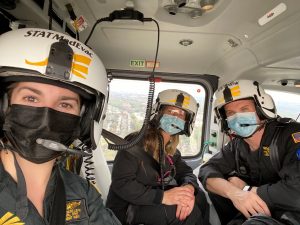 Caroline: I’m a big advocate of not being just a passenger. And our company is a big proponent of that as well. In addition to being specialty certified, all of our flight crew members have to go through aviation safety training as well. I think it’s very important to continue to ask questions of the pilots, the maintainers, the chief pilot, safety operations, etc., so that you’re not just blindly flying along and saying to yourself, if the pilot says it’s okay, it must be okay.
Caroline: I’m a big advocate of not being just a passenger. And our company is a big proponent of that as well. In addition to being specialty certified, all of our flight crew members have to go through aviation safety training as well. I think it’s very important to continue to ask questions of the pilots, the maintainers, the chief pilot, safety operations, etc., so that you’re not just blindly flying along and saying to yourself, if the pilot says it’s okay, it must be okay.
Knowing what is going on with both the aircraft and the patient really sets CFRNs, specifically, apart from other certifications. It’s also about being able to bring that expertise and experience to the bedside, and say to a family member or to a patient who has never flown before: This is what you may experience in flight, this is what’s normal, this is what we’d do in an emergency, and don’t worry if we’re not worried.
And for us as crew members, being able to say: Hey, I really don’t feel comfortable with this flight, or maybe this would be better served as an ambulance mission. It’s about knowing that we’re never going to put ourselves or our patients in danger just because a helicopter is faster.
A Poignant Patient Story
Caroline tells the story of when she and her flight crew were transporting a 7-year-old girl who had taken a tree branch to the head. She was in and out of consciousness when Caroline’s flight team arrived.
Caroline: It’s crazy to say it now, but I think she was fine. But at the time, it was: Did she have a concussion or was it more serious than that? And what really stood out for me was that the mom was just beside herself. She was extremely upset that her child might be critically ill and that her child has to go in a helicopter. So I said to her: ”Here’s what we’re going to do. You are going to calm down, and I’m going to put you in the helicopter with us and you’re going to come with us.”
I explained that we were going to take the very best care that we could of her child, and that we wouldn’t do anything without telling her. I told her we had the ability to take care of her daughter here just as well as they can take care of her at the hospital we’re going to take her to. But she needed to calm down so she could come with us.
So, we made it through the flight, and the little girl did perfectly fine. And when we got to the hospital, the mom pulled me aside, gave me a big hug, and said thank you so much for calming me down so that I could be here with her.
I thought this was so special because it was not just about her child, but it was about her too. It was about bringing her that reassuring presence of if I can put you in the helicopter and make sure that you are safe so that we can deliver the best care that we can for your kid … and make sure that you are there too when she is awake or when the doctors need to speak to you … I think that is very rewarding.
When we transport children, we do our very best to bring a parent with us, but sometimes that’s not possible. I think having a certification and being able to say: I know your child is critically ill, and I know you are scared, but this is the experience that I bring to the bedside. I think bringing that calming and assuring environment to that parent and them allowing three strangers to take their 6- or 7-year-old knowing that you are going to do the right thing for their child shows there’s a lot of trust there.
A Message for New Flight Nurses, A Deep Bow to Veteran CFRNs
We asked Caroline what she’d most like to say to aspiring and new flight nurses and CFRNs.
Caroline: Now that I’ve moved more into education, and I get to interact with brand new flight nurses and brand new flight paramedics, my favorite thing that I like to tell them is: You’re going to make it through orientation … and a year down the line, you’re going to have a patient laying in front of you in the helicopter, and you’re going to be taking notes, looking down, looking at your patient, checking your drips, and you’re going to look up and realize you are flying through the air. At some point you’re going to forget that you are in a helicopter taking care of this patient and you’re just going to be focused on your patient.
There is no better feeling in the world than knowing that you have set yourself far above just being able to provide basic care to a patient … to the point where you can manage this patient, just yourself and one other person, and do it in an environment that is so unique that there are only about 5,000 people out there who are certified who will ever experience it.
It’s Okay, We Got This
So, what is the certified spark inside of Caroline? Here’s what she had to say.
Caroline: At the end of the day, I don’t try to educate people or train people or inspire people to be who somebody has to fly with, but somebody that people want to fly with—that is, the person who, if it hits the fan at 2500 feet, can look across the helicopter at their partner and say, “It’s okay, we got this.”
That’s the type of nurse I want to inspire, and that’s the type of nurse I aim to be—someone who is compassionate … and who can be relied upon because they have the knowledge and skill base that comes with being certified and which instills confidence in their patients and families—and is therefore prepared to take the best possible care of every patient.
Send us an email and tell us your Certified Spark story. We’d love to hear from you!
